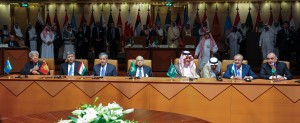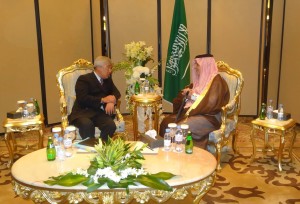 RIYADH – The countries of the Arab League, Central Asia and Azerbaijan have made a major step towards bolstering their ties and recreating the commercial links characteristic of the Silk Road of yore when they agreed to work to increase their cooperation across a number of fields at the first gathering of these countries hosted by Saudi Arabia in its capital on May 13.
RIYADH – The countries of the Arab League, Central Asia and Azerbaijan have made a major step towards bolstering their ties and recreating the commercial links characteristic of the Silk Road of yore when they agreed to work to increase their cooperation across a number of fields at the first gathering of these countries hosted by Saudi Arabia in its capital on May 13.
The First Forum on Economy and Cooperation of Arab Countries with Central Asian States and Azerbaijan brought together delegations from 22 Arab League countries, five states in Central Asia as well as their neighbour across the Caspian Sea, Azerbaijan.
Foreign Minister Erlan Idrissov headed a Kazakhstan delegation to the forum, which was inaugurated and chaired by Saudi Arabian Minister of Foreign Affairs Prince Saud Al-Faisal.
In one speech after another at the gathering, the Central Asian and Azerbaijani foreign ministers, Arab foreign ministers and Secretary General of the Arab League Dr. Nabil Al-Arabi confirmed their intention to develop economic relations and partnerships between the sides to contribute to growth, wellbeing, peace and stability in their regions.
The participants stressed the depth of historic, religious and cultural connections and the prospects of economic cooperation. The conference hall of Riyadh’s Intercontinental Hotel, where the forum took place, heard numerous references to traditional ties between the countries gathered, starting with the commonality of religion and the functioning of the famous Silk Road in the past, which bodes well for the development of trade and economic ties in the 21st century.
They also noted the common advantages of Arab and Central Asian states and Azerbaijan, starting with rich natural resources and including promising new industries like food production, power generation, petrochemical production, mining and tourism.
Prince Saud said, “When we talk about the relationship between the two sides, we are talking about a long historic relationship that extends to long years of religious, cultural and trade ties. We are very pleased with the outcome of today’s meeting, which was reflected in the two sides’ formal statements, which included constructive initiatives for closer cooperation.”
In his remarks, Foreign Minister Idrissov underlined the importance of Kazakhstan’s chairmanship of the Organisation of Islamic Cooperation’s Council of Foreign Ministers in 2011-2012, and expanded on potential avenues for cooperation.
“The OIC chairmanship offered a great opportunity for our country to enhance our relationship with the Arab world and enabled us to identify the areas where our interests are shared and converge and, therefore, where we might cooperate with the greatest effect,” he said in his remarks, further stressing that Kazakhstan “welcomes the Arab League resolutions on deepening its collaboration with Central Asian countries and Azerbaijan.”
Currently, Kazakhstan hosts the embassies of Saudi Arabia, the United Arab Emirates, Egypt, Qatar, Jordan, Iraq, Oman, Libya, Lebanon and Palestine. Kazakh diplomatic missions operate in Saudi Arabia, Egypt, Jordan, Qatar, the United Arab Emirates, Oman and Lebanon and it plans to further expand our diplomatic presence in the Arab World.
“The growing attention to each other might be also manifested through the opening of the Arab League regional office for Central Asia in Almaty, which we are planning to transform into the UN regional humanitarian hub,” Idrissov said.
He went on to speak about recent economic achievements in the country. Kazakhstan is one of the world’s most dynamically developing economies, Idrissov noted, and among the 50 countries easiest to do business in, according to the World Bank. The country is also shifting from being a recipient of investment to becoming a donor and investor itself, he said.
“We have attracted more than $190 billion in foreign direct investment. But Kazakhstan is not only a recipient country, but also increasingly an investor in other countries’ economies. To date, Kazakhstan has invested more than $30 billion overseas,” he said. He also added that Kazakhstan’s GDP per capita totaled around 13,000 dollars in 2013, with the expectation that it will grow to 24,000 dollars by 2017. Cumulative international reserves of Kazakhstan have reached 100 billion dollars.
Yet, the trade and investment cooperation with the Arab world has been limited so far.
“For all the great promises of our bilateral trade and economic relations, which is the focus of today’s forum, we believe we are still far from realizing their true potential,” Idrissov stressed. “For example, Kazakhstan’s trade with all the Arab countries stands at approximately 100 million dollars annually, which is miniscule compared to our bilateral trade with other countries and, I am sure, compared with the Arab countries’ trade with other partners. For example, Kazakhstan’s trade volumes with China and Russia now stand at $25 billion with each, while our trade with the European Union is $50 billion.”
Idrissov went on to note new factors that he said would further Kazakhstan’s development and would make it more attractive for companies from the Arab world and beyond.
One particular area is the improvement in investment climate, and the proposed adoption of new laws in Kazakhstan this year to that effect. Another area with good potential for cooperation is Islamic financing, with Kazakhstan embracing its principles several years ago.
Major infrastructure projects are another promising domain.
“There are significant infrastructure projects already being implemented in Kazakhstan with the participation of Arab partners, including, for example, a hospital and a highway built with the support of the Saudi Arabia, the construction of the Abu Dhabi plaza in Astana, which would be the tallest building in Central Asia,” Idrissov said. “Another example is the activity of the Islamic Development Bank in support of infrastructure projects in Kazakhstan. More projects in infrastructure will surely be more than welcome as we work to capitalize on Kazakhstan’s unique position as a geopolitical and geo-economic bridge in Eurasia.”
In fact, according to the Kazakh minister, the upcoming establishment of the Eurasian Economic Union, which would create a common market of more than 170 million people and a common economy valued at $2.2 trillion is another factor which should make it more attractive for Arab companies to invest in Kazakhstan and work with Kazakh businesses.
Two other potential areas for greater cooperation are the green economy and the upcoming international specialised exhibition EXPO 2017 in Astana.
“The topic of the upcoming expo is ‘Future Energy,’ which we hope will help nurture collaboration on renewable energy and the shift to a green economy, an area where some Arab countries, such as the United Arab Emirates, have achieved impressive results,” the Kazakh minister said.
“We also think it is important to find ways to expand trade volumes between Arab countries, Central Asia and Azerbaijan. A joint Chamber of Commerce and a Business Council would mark a great step toward achieving that goal. It is also critically important to develop transportation and infrastructure across the region, from North to South and from East to West. It is also important to connect the business communities of our countries; promote public-private partnerships in infrastructure projects,” he said.
At the conclusion of the meeting, a memorandum of cooperation between the Arab League and the countries of Central Asia and Azerbaijan was signed, signifying the institutionalization of the new forum.
While in Riadh, Erlan Idrissov met with his counterparts, the foreign ministers of Saudi Arabia, Qatar, Bahrain, Kyrgyzstan, Lebanon, Oman, and Tunisia. He also met with the Arab League Secretary General al-Arabi to discuss strengthening cooperation between Kazakhstan and the organisation.

